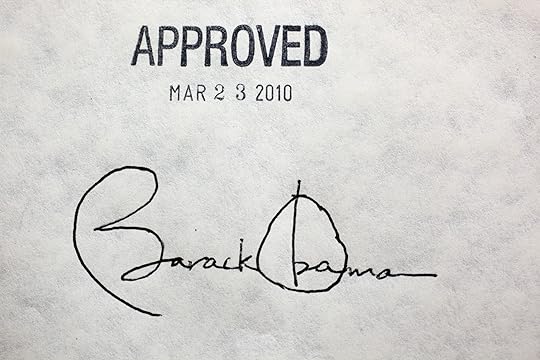Sarah Gailey: Get Rich Or Die Trying — On Repealing The ACA
Fellow awesome writer person Sarah Gailey had some stuff to say about the class eugenics that lurk unspoken in the repeal of the Affordable Care Act, and if you know Sarah, you know that what she writes is worth reading. Just check out her work at Tor.com, or her upcoming novella (omg hippos), River of Teeth.
Healthcare is essential to human life.
Without it, people die. Babies die. Mothers die. Kids with allergies die. Grandfathers with pancreatic cancer die. People with disabilities die. A steelworker who gets his hand crushed, a farmer who gets bitten by a snake, a teacher who has a heart attack. Without doctors and medicine and treatment, people who get sick or injured die.
This is the endgame of the ACA repeal: death for those who can’t afford insurance and who can’t privately pay for healthcare. Death for the poor, death for the unemployed, death for the newly self-employed entrepreneur, death for the laborer with three part-time jobs and no benefits. Death for the widow who relied on her late husband’s insurance; death for the orphan who was a dependent. Death for the infant whose mother couldn’t afford birth control or prenatal care. Wealth or death: those are the choices.
While this may sound harsh, it shouldn’t be surprising. The social Darwinism that drives so much of America’s rhetoric — the pull-yourself-up-by-the-bootstraps narrative that undergirds the American Dream — makes a snug fit with the consequences of the ACA repeal. This is the comfort of the wealthy: those who can’t afford healthcare can’t afford it because they’re lazy. They didn’t try hard enough, so when they die, they have only themselves to blame.
“If you can’t afford treatment, you don’t get treatment.” This is the basic concept that drives opposition to universal healthcare — and yet, even that blunt statement flinches away from the true conclusion of its execution. The true conclusion is this: “if you can’t afford treatment, you deserve to die.” Those who can’t afford antibiotics will die of fevers. Those who can’t afford dental care will die of rotten teeth. Those who can’t afford chemotherapy will die of cancer.
In this scenario, the poverty that American morality has always scorned becomes a capital offense; the pursuit of wealth, a necessary route to survival. Never mind that wealth is overwhelmingly concentrated in populations of privileged white people with family legacies that are rooted in the exploitation of those who benefit from the programs like the ACA — never mind that. [8 people hold as much wealth as 3.6 billion — cdw] The bottom line is this: those who are not wealthy enough to afford the cost of healthcare will be eliminated.
How could this be allowed to happen? How, in our nation, which we call the wealthiest, the greatest, the strongest nation on earth? How could we propose to allow millions of citizens to go without the medical care they need? How?
Well. Let’s talk about eugenics.
For those who are unfamiliar with the concept, eugenics is a horrific application of selective breeding. To understand selective breeding, imagine a gardener who wants all of his pea plants to have purple flowers on them. He would have to weed out the pea plants with white flowers on them, and plant only seeds from the plants with purple flowers.
In 1937, a guy named Frederick Osborn proposed that the principles of selective breeding should be applied to the social order: encourage people with desirable traits to reproduce, and sterilize “undesirables” to remove their genes from the pool. Osborn’s ideas were heavily tied into the rhetoric of social Darwinism, which suggests that the law of natural selection applies to modern society: only the strong deserve to survive.
Many will rightly associate this concept with fascism and particularly with Nazi Germany — but it cannot be forgotten that eugenics was popular throughout the Western world, and particularly in the United States, during the early 20th century. Our country participated in the “removal” of traits which the government deemed undesirable — traits which included mental illness, physical disability, nonwhite heritage, and any sexual identity other than heterosexual. In 1927, the United States Supreme Court passed Buck v. Bell, which effectively legalized compulsory sterilization. Individuals were sterilized against their will, incapacitated, or killed under the euphemism of ‘euthanasia’.
Today, this practice is widely considered to be unethical, dehumanizing, and morally repugnant. The repeal of the ACA brings it to the forefront of American society, hidden behind a thin veil of capitalist ideology.
Does this embody the national character Americans claim to have? We call ourselves “the greatest nation in the world,” and “the land of opportunity.” We pride ourselves on our immense national wealth. We claim to have a social, political, and economic system upon which all others should be modeled — and yet we are debating a proposition that would leave millions of Americans at risk of death due to a lack of coverage. And so it is that we must ask ourselves: does an American morality that leaves the uninsured to die embody the universal right to life that is promised in the second sentence of our Declaration of Independence?
No. Instead, it embodies the darkest facet of the American perspective on capitalism: that citizens are justified only by their earnings, and that without justification through labor and wealth, the life of a citizen is not the concern of the American government. This is the America that we so consistently look away from: the America whose constitution was written solely for the benefit of landed white men. The America that pioneered early eugenics; the America that, years before Hitler’s rise to power, began attempting to rid itself of “undesirables.”
Today, those citizens who are not wealthy are being declared undesirable by the ACA repeal.
And we know what happens to undesirables.




